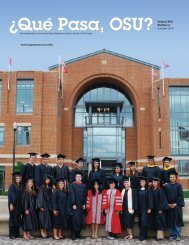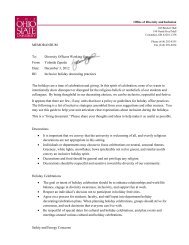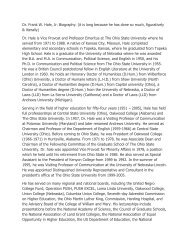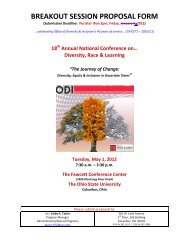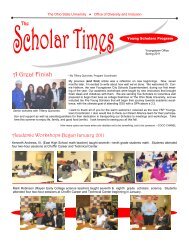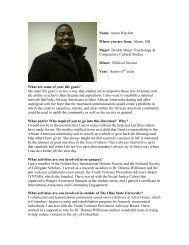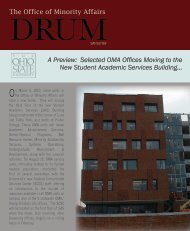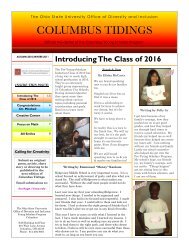Qué Pasa, OSU? - go to site
Qué Pasa, OSU? - go to site
Qué Pasa, OSU? - go to site
- No tags were found...
Create successful ePaper yourself
Turn your PDF publications into a flip-book with our unique Google optimized e-Paper software.
We Decide.Latin@s and the 2012 Presidential ElectionBy Francisco-Xavier Gómez-Bellengé, Associate <strong>to</strong> the Dean, Fisher College of BusinessFollowing the re-election of GeorgeW. Bush in 2004, pundits declared a newpermanent republican majority due <strong>to</strong>shifting demographic and political forces.It is with some skepticism, then, that wemust view similar claims of a new permanentdemocratic majority following there-election of Barack Obama in 2012. Oneof the new forces, it is said, is the rise ofLatinos as a significant elec<strong>to</strong>ral force fordemocrats. Indeed, a recent Pew Centerstudy predicts a doubling of the Latin@vote by 2030.Republicans can recognize demographictrends as well as Democrats soin the days after Obama’s re-election,republican pundits discussed how <strong>to</strong> get alarger share of that essential Latin@ vote.It was scarcely possible <strong>to</strong> have a discussionof presidential politics without mentioningMarco Rubio, the Florida sena<strong>to</strong>r,as an early leader in the 2016 republicanpresidential sweepstakes. Both Rubio andSusana Martinez, the <strong>go</strong>vernor of NewMexico, had been mentioned as possiblevice-presidential running mates of MittRomney. Latin@s, the argument went,were a natural fit for the Republican Partybecause of their religiosity and conservativesocial values. All that was needed wasa suitable candidate.There are <strong>go</strong>od reasons <strong>to</strong> be skepticalof this line of reasoning. Neither AlanKeyes in 2008 nor Herman Cain in 2012had any discernible impact on the AfricanAmerican vote. If recent his<strong>to</strong>ry is any indication,neither race nor ethnicity aloneis likely <strong>to</strong> sway a significant numberof voters. A different argument is thatpresumably, a Rubio or Martinez presidentialcandidate would espouse moreLatin@-friendly policies. Indeed, Rubiohas advocated for less stridently antiimmigrantpolicies and a different <strong>to</strong>ne inthe national conversation on immigration.However, when Texas Governor Rick Perrydid as much during the 2012 Republicanprimaries, he quickly fell out of favor withRepublican voters. Policies alone are notan obvious solution because a primarycandidate who would be Latin@-friendlyenough <strong>to</strong> attract a significant portion ofthe Latin@ vote might find it difficult <strong>to</strong>get enough non-Latin@ support in theprimaries.A look at some basic issues is in order.The very concept of Hispanic/Latin@identity is problematic as a number ofscholars have argued. In Ethnic Groups andBoundaries, Fredrik Barth sets four conditionsfor the existence of an ethnic group;1. Is largely biologically self-perpetuating2. Shares fundamental cultural values,realized in overt unity in cultural forms3. Makes up a field of communicationand interaction4. Has a membership that identifiesitself, and is identified by others, as constitutinga cate<strong>go</strong>ry distinguishable fromother cate<strong>go</strong>ries of the same order.While this definition works well withsome racial and ethnic groups in theU.S. and elsewhere, it does not work particularlywell with U.S. Hispanic/Latin@s.Barth says “ethnic groups are cate<strong>go</strong>riesof ascription and identification by theac<strong>to</strong>rs themselves” yet many Latin@sderive their ethnic identity primarily fromtheir country of origin, not from somepan-ethnic or pan-national origin. Evenamong Americans of Mexican origin, forexample, identity depends on a variety offac<strong>to</strong>rs such as length of time in the U.S.,region of origin or region of residency.Chicano identity, for example, is distinctfrom Mexican, Mexican-American, andHispanic/Latin@ identity. Also, someLatin@s are outwardly English dominantand acculturated but nevertheless mindfulof how national politics affect others withtheir same physical appearance, ancestryor last name. The terms “Hispanic” or“Latino” in fact capture a diverse rangeof ethnic groups/national origins acrossand within Spain, Portugal, and a varietyof countries in Latin American and theCaribbean. The nomenclature “Hispanic”was invented by the U.S. Census Bureau.So although there is some understandin<strong>go</strong>f cultural and linguistic commonalityamong all Spanish speakers in Spainand the Americas, it is not nearly as welldefined as the African American racial/ethnic identity or the Italian-Americanethnic/national identity, for example.Arlene Dávila has argued that in bothmarketing research and political polling,the nuanced and varied identities ofLatin@s tend <strong>to</strong> become subsumed <strong>to</strong>broader narratives that ascribe desiredcharacteristics <strong>to</strong> the entire group, whitewashingmany internal differences. Thesenarratives highlight attributes suitable<strong>to</strong> whatever argument is being made ina given situation. If one is promoting thevalue of marketing <strong>to</strong> Latin@s on Spanishlanguagemedia, the distinction betweenbeing Spanish-speaking and being Latin@is overlooke d even though less than halfof U.S. Latin@s understand Spanish orare Spanish language-dominant. If one ischampioning the size of the U.S. Latin@market, distinctions based on immigration,language, national origin, income,education or geographic location areoverlooked even while differences in identificationas Latino vary widely among allthese groups. In the political arena, whenemphasizing conservative values, theCatholic heritage is assumed <strong>to</strong> influenceall Latin@s although many long a<strong>go</strong> converted<strong>to</strong> other religions such as Seventh-Day Adventism or are not religious at all.When arguing that Latin@s are a naturalDemocrat constituency, a different set ofcharacteristics are emphasized.So how can Republicans attract theLatin@ vote? Voters look beyond specificcandidates and policies <strong>to</strong> the general<strong>to</strong>ne of a campaign and a party. In recentyears, the debate on immigration hasturned increasingly vicious. States suchas Arizona and Alabama have passedvindictive laws. Politicians, public figuressuch as Rush Limbaugh and presidentialcandidates have competed <strong>to</strong> be seen asmore implacably hostile <strong>to</strong> Latin@s thantheir rivals under the guise of protectingthe nation from undocumented immigrants.Even Latin@s not directly affectedby these laws and debates feel profoundlyimpacted by such hostile rhe<strong>to</strong>ric. Thelack of any visible opposition <strong>to</strong> thisbi<strong>go</strong>try and the racial homogeneity of theRepublican Party have made it a very hardsell for Latin@s. This is not likely <strong>to</strong> changeeasily.Democrats cannot take Latin@s forgranted either. President Obama’s support12




